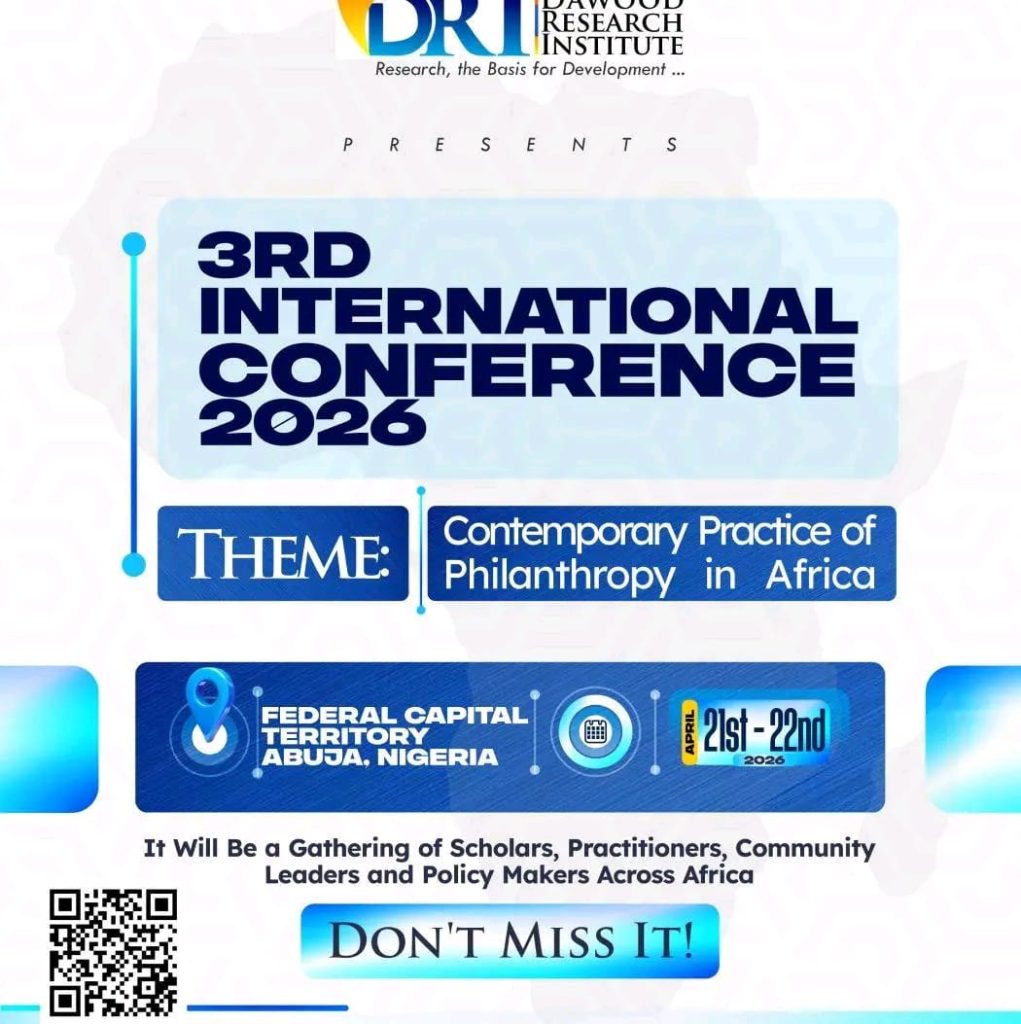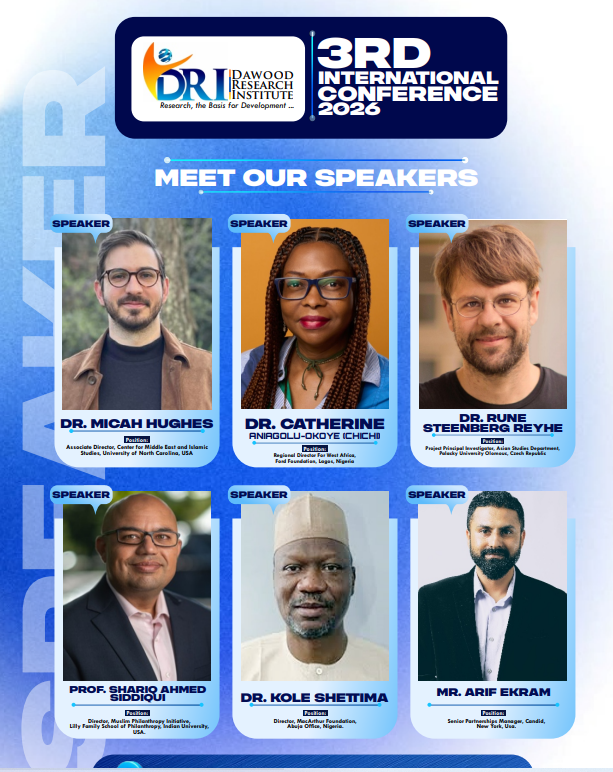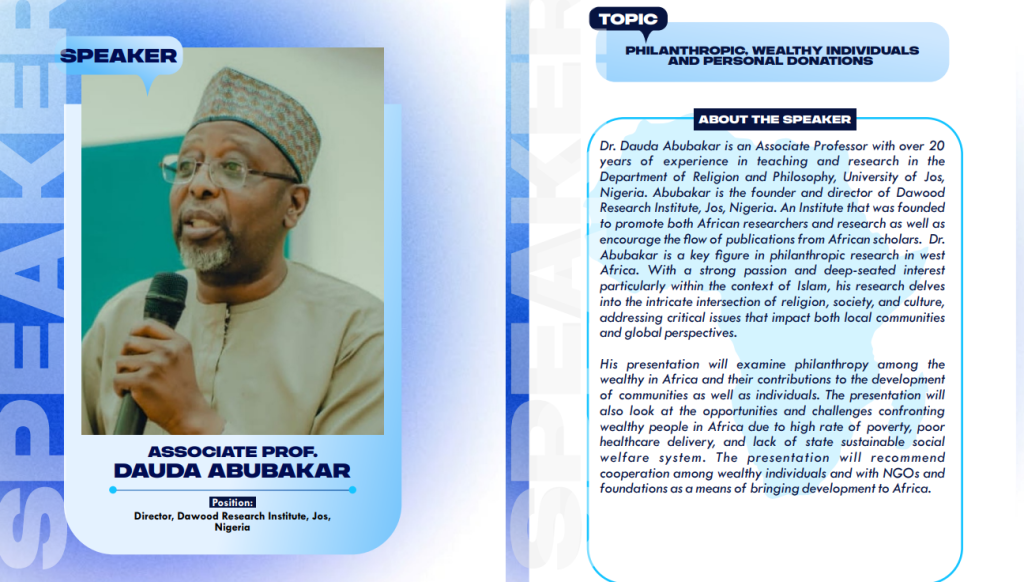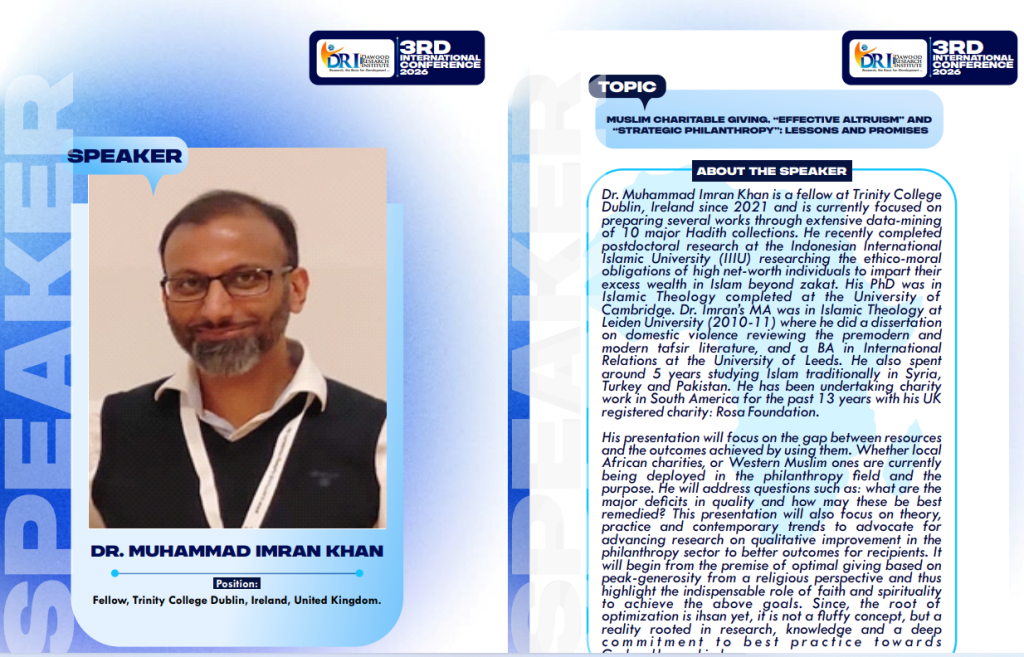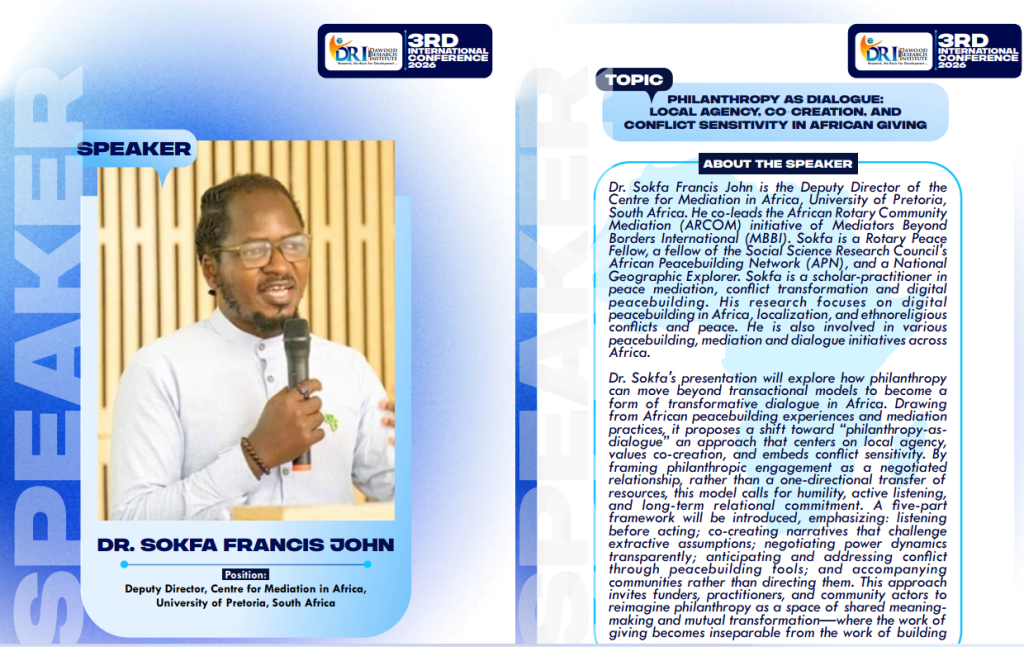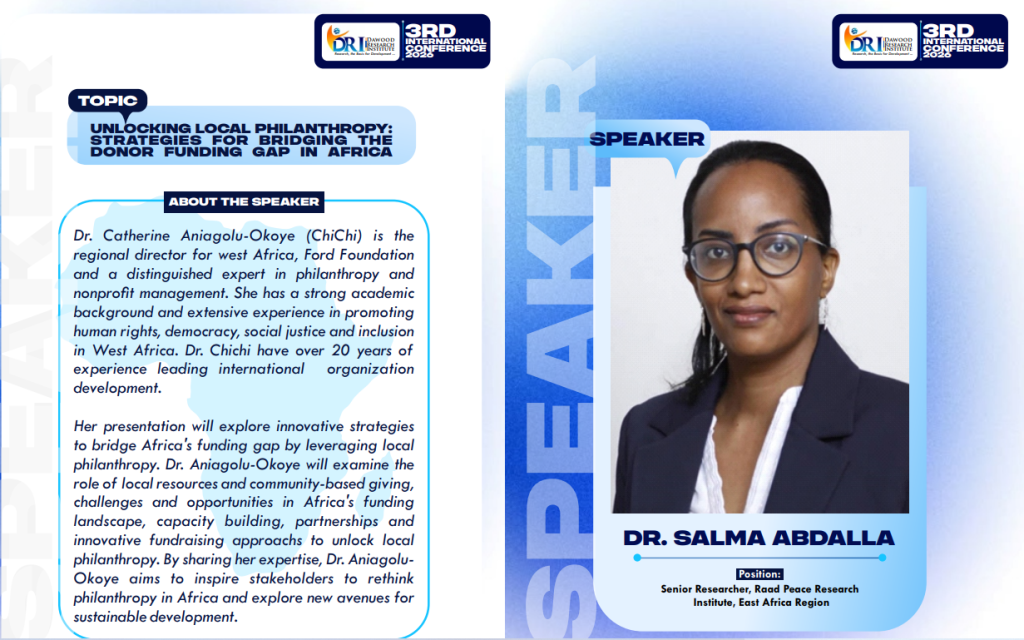— Talking with the public
conferences
Innovating today for the breakthroughs of tomorrow —
the DRI Conference is where research meets real-world impact.”
April, 2023
International confrences
DRI’s 1st international conference was held in April 2023 in collaboration with the Faculty of Arts, University of Jos, Nigeria. The conference brought together scholars and practitioners from Nigeria and different African countries such as Kenya, Ghana, Sudan, Niger Republic, etc. The 2nd international conference organized by DRI was held in February 2024 at the Dangote Business School, Bayero University Kano, Nigeria in collaboration the International Institute of Islamic Banking and Finance, Bayero University Kano and with six universities in and outside Nigeria. These universities include Indiana University, USA, University of Jos, Nigeria, Al-Istiqama University, Sumaila, Kano Nigeria, Sule Lamido University, Kafin Hausa, Jigawa Nigeria, Khalifa Isyaku Rabiu University, Kano Nigeria, and Umaru Musa Yaradua University, Katsina, Nigeria.
Upcoming Conference April 2026
We are excited to announce that the Dawood Research Institute (DRI) will be hosting its Annual Research & Innovation Conference in April 2026.
This landmark event will bring together researchers, academics, innovators, policymakers, and thought leaders from across Nigeria and the African continent to explore groundbreaking ideas, share scholarly work, and foster impactful collaborations
🗓️ Event Highlights:
Date: April 2026
Theme: “Contemporary Practices of
Philanthropy in Africa:
Prospects and Challenges”Sessions: Keynotes, Research Presentations, Panel Discussions, Networking Opportunities
Open to: Scholars, Institutions, NGOs, Government Agencies, Industry Experts
✅ How to Participate:
Interested participants should sign up via the link here
Note Conference Registration will commence from 1st May 2025 to 31st January 2026.
Registration:
Outside Africa: $200
From Africa: $50
From Nigeria: N30,000
Note that all registered participant will be contacted via email with further details.
NGOs should contact DRI for their conference registration.
🔗 For inquiries or early expressions of interest, please contact us at:
📧 driconference@dawoodresearchinstitute.com
🌐 www.dawoodresearchinstitute.com
3rd International Conference April-2026
Introduction
The Dawood Research Institute (DRI) is a non-profit research organization
registered in Nigeria. DRI conducts its research activities in Nigeria in
collaboration with local and international partners. Its main activities are
social and academic research and most of these have been in the area of
philanthropic studies, interfaith relations, social justice and offering
consultancy services. DRI also organize conferences and workshops aimed at
st making lasting impact in Nigerian society as well as Africa at large. The 1
international conference organized by DRI in April 2023 was on
“Contemporary Practice of Zakat in Africa” with funding from the Muslim
Philanthropy Initiative, Indiana University, which brought together scholars
and practitioners from Nigeria and parts of Africa. The conference was held at
nd the University of Jos, Nigeria. The theme of the 2 DRI international
conference was “Contemporary Practice of Philanthropy and Educational
Endowment in Africa” held in February 2024 at the Bayero University Kano
in collaboration with Indiana University, USAand six universities in Nigeria.
The conference was funded by the Ford Foundation, Habibiyya Islamic
Society, and Ammasco International Ltd, Nigeria.
rd The theme for DRI’s 3 international conference is “Contemporary Practices
of Philanthropy in Africa: Prospects and Challenges.” This is meant as a
follow-up on development in the area of philanthropy and to draw scholarly
attention to this emerging area of study in Africa. Our hope is that this
conference will attract wider attention from Nigeria, other countries within
Africa and different parts of the world.
Conference Location: Faculty of Arts, University of Abuja, FCT Abuja,
Nigeria.
Abuja, the Federal Capital Territory (FCT) is chosen for this conference
because of its strategic position in Nigeria and easy accessibility for both local
and international participants.
Collaborations:
Apart from the Muslim Philanthropy Initiative, Lilly Family School of
Philanthropy, Indiana University, USA, University of Abuja, and the
University of Jos, we are currently discussing collaboration with different
partners.
Partnership and Sponsorship:
We are seeking sponsorship from different bodies and individuals for the
success of this conference because Abuja is an expensive city. The logos of
partners and sponsors will be displayed on the conference banners, will be
published in the conference book containing abstracts, and included in all the
Institute’s social media platforms and other promotional materials.
Participants
We are expecting both local and international participants at the conference.
The category of participants expected to attend this conference in Abuja,
Nigeria include:
1. Scholars: The conference will bring together scholars from different
universities in Nigeria, Africa and other places in the world to share
their research and insights on philanthropic practices in Africa.
2. Practitioners: The conference will bring together practitioners that
are administering organizations, foundations, NGOs, and heading
community initiatives that are engaged in philanthropic work in
Nigeria and other African countries.
3. Individual Philanthropists: The conference is expected to bring
together some High-Net-Worth Philanthropists from Nigeria and
other African countries to share their experiences and research
expectations.
4. Politicians and Policymakers: The conference will also bring
together politicians and policymakers from different countries in
Africa. This category will include dignitaries such as the Vice
President of Nigeria in the person of Kashim Shettima Mustapha.
Also, government representatives are expected to attend from Nigeria
and selected African countries.
5. Non-Governmental Organizations (NGOs): The conference is also
expected to attract a large number of humanitarian NGOs.
Keynote Speakers and Lead PaperPresenters:
The conference CPC has identified two keynote speakers and some Lead
Paper presenters as follows:
Keynote Speakers
1. Prof. Shariq Ahmed Siddiqui (Director, Muslim Philanthropy
Initiative, Indiana University, USA).
2. Dr. Kole Shettima (Director, Nigeria Office, MacArthur Foundation,
Abuja).
Lead Paper Presenters:
3. Dr. Catherine Aniagolu-Okoye (ChiChi) (Regional Director for
West Africa, Ford Foundation, Lagos, Nigeria).
4. Mr. Arif Ekram (Senior Manager of Partnerships, Candid, New
York, USA).
5. Dr. Micah Hughes (Associate Director, Center for Middle East and
Islamic Studies, University of North Carolina, USA).
6. Dr. Steenberg Reyhe Rune (Principal Investigator, Asian Studies
Department, Palacky University Olomouc, Czech Republic).
7. Dr. Sokfa Francis (Deputy Director, Centre for Mediation in Africa,
University of Pretoria, South Africa).
8. Prof. Nantawe Goshwe Yilwatda (Honourable Minister of
Humanitarian Affairs, Disaster Management and Social
Development, Abuja, Nigeria). Waiting for confirmation.
9. Rt. Hon. Yusuf Adamu Gagdi, PhD (Member, Representing
Pankshin/Kanke/Kanam Federal Constituency, National Assembly,
Abuja, Nigeria). Waiting for confirmation.
Co-Chairpersons for the Opening Day
1. Alh. Ibrahim Sale Hassan
2. Sheikh Nuruddeen Lemu
Conference Objectives
Specific objectives of the 2026 philanthropy conference include:
1. To explore the current state of philanthropy including challenges and
opportunities in different parts of Africa.
2. To foster collaborations and networking between philanthropists,
practitioners, researchers, and policymakers in Africa.
3. To showcase innovative philanthropic practices and models in Africa.
4. To create and facilitate an interactive platform that will bring together
practitioners and researchers in Africa.
5. To promote the study of philanthropy in Africa.
Overview of the Conference Theme
Philanthropic practices have grown from strength to strength in Africa, which
generates a lot of scholarly interest as well as entice the attention of local and
international foundations, NGOs, and community initiatives. This has
gradually progressed over the last two decades. The recent boost in
philanthropic activities in Africa came as a result of the COVID-19 pandemic
lockdown (2020-2022); foundations, NGOs and particularly individual
philanthropists became visible on social media.
This advanced philanthropic practices and activities to another level that have
become effective in reducing the agony of people in need. Today, the scene of
philanthropy is witnessing diverse interest groups; wealthy individuals,
practitioners, foundations and NGOs affiliated to both local and international
donor agencies, faith-based and community initiatives, etc. Sub-Saharan
Africa is home to numerous complex issues ranging from poverty to health
and malnutrition, from inadequate education to lack of sufficient social
welfare and limited social justice, as some prominent examples. Therefore,
billions of dollars in foreign aid enters Africa annually, which is directed
towards humanitarian purposes to alleviate suffering and improve the
economic wellbeing and standard of livelihood of those people in need. Local
effort is exerted to assist a cross section of vulnerable members of society.
This is achieved by those motivated from different primary perspectives:
religious and social (humanitarian).
As donors make desperate efforts from various convictions to assist and
improve the quality of life of the indigent, diverse practitioners also provide
their own contributions by disseminating and channeling funding into
different aspects of need. It is assumed that local philanthropists and some
organizations, as well as community initiatives, are often closer to the people
and that therefore, they are more aware of people’s needs. The rise of
charitable activities of local philanthropists reflects the fact that they are
individually and collectively realizing the importance of giving back to their
communities towards the social wellbeing of the society they live in,
addressing critical issues such as education, healthcare, daily feeding and
shelter. Professionals are scattered in different local and international
organizations, some in paid employment while others are providing services
evolving around philanthropy in Africa. The responsibility of scholars is to
analyze these philanthropic endeavors and to provide recommendations for
the rest of the world to better understand these processes, developments and
shortcomings in Africa and to respond with enhanced interventions and
superior strategies in the deployment and allocation of resources. Research
can also help professionals, foundations and NGOs to understand areas that
require more attention.
Therefore, the Dawood Research Institute (DRI), its local and international
partners are creating a forum to the facilitation of cutting-edge research,
symposiums and a series of international conferences on the different
developments pertaining to the current philanthropic landscape in Africa.
DRI’s publications are also avenues that encourage discourse on
philanthropic activities/practices in Africa. This conference will bring
together scholars from different universities and institutions in Africa and
beyond, professionals and individual philanthropists as well as foundations
and NGOs to share their research, experiences and recommendations.
Under the theme of the conference: “Contemporary Practices of Philanthropy
in Africa: Prospects and Challenges”, participants are expected to look at
philanthropy from a broader perspective considering models of excellent in
diverse African societies. Abstracts for participation in this conference can be
submitted on any of the following sub-themes (but not limited to them):
• The Impact of Philanthropy on Development in Africa
• Motivation, Opportunities and Challenges of Philanthropy in Africa
• Theoretical and Conceptual Analyses of Philanthropy
• Philanthropy and the Role of Charitable Foundations in Africa
• The Challenges Confronting Philanthropic Institutions and NGOs in
Africa
• Philanthropy, Faith-Based Organizations and Development in Africa
• The Rise of Community-Based Philanthropy in Africa
• The Challenges of Collaboration among Philanthropic Institutions in
Africa
• Philanthropy, Healthcare, and Educational Development in Africa
• The Field of Philanthropy and Scholarly Publications in Africa
• The Role of Philanthropy in Poverty Alleviation in Africa
• International Donor Organizations, Aid Cut, and Philanthropy in
Africa
• Ramadan and Charitable Giving in Africa
• Financial Institutions and Corporate Philanthropy in Africa
• Contesting Philanthropy in Africa: Needy and Professional Beggars
• Crowdfunding and Online Philanthropy in Africa
• The Rise of Female Philanthropists, a Challenge for Male
Philanthropists in Africa?
• Philanthropy and Socio-Economic Development in Africa
Participants (especially scholars) are expected to submit abstracts of not more
than 150 words for consideration. Full papers are not to exceed 8,000 words,
should be 12-point font size, Times New Roman, 1.5 line-space. Both
abstracts and full papers must be written in American English. Accepted
papers will be informed of the citation format to use.
Language of Presentation:
The language preferences are:
1. Scholars and practitioners will present their papers in English.
2. Individual philanthropists can choose to make presentations in any
language of their choice provided there will be a translator.
Registration:
Outside Africa: $200
From Africa: $50
From Nigeria: N30,000
NGOs should contact DRI for their conference registration.
Important Dates:
|
Conference Planning Committee (CPC) Below is the list of the conference planning committees (CPC); each will have between 3 to 10 members. The names and terms of reference for each committee will be outlined in their letters of temporary engagement. The following are the main conference committees:
- Secretariate Committee (3 members)
- Security Committee (5 members)
- Media and Publicity Committee (3 members)
- Venue and Accommodation Committee (7 members)
- Welfare Committee (5 members)
- Transportation and Itinerary Committee (5 members)
- Reception and Protocol Committee (10 members)
Conference Coordinators: Mr. Nabibi Monday and Dr. Umar Yusuf Abdullahi.
Conference Director: Associate Prof. Dauda Abubakar, Director, Dawood Research Institute.
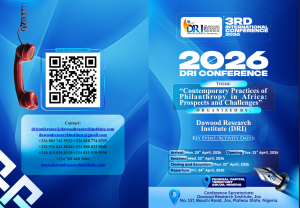
MEET OUR SPEAKERS
